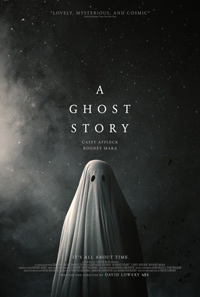Voyage of Time: Lowery’s Distinctive, Elegiac Treatise on Grief, Time, and Elusive Solace
 Although it isn’t an actual adaptation of her short story, David Lowery’s A Ghost Story begins with the opening line from Virginia Woolf’s A Haunted House, a volume of work published posthumously by the author’s husband. “Whatever hour you awoke, there was a door shutting.” And so begins the seemingly idyllic portrait of a heterosexual couple as they embark on buying a home, brief segments of their time together ending abruptly when the husband (Casey Affleck) dies suddenly in a car crash, his ghostly spirit then lurking on the premises underneath a white sheet with two black spots for eyes as the wife navigates the stages of grief.
Although it isn’t an actual adaptation of her short story, David Lowery’s A Ghost Story begins with the opening line from Virginia Woolf’s A Haunted House, a volume of work published posthumously by the author’s husband. “Whatever hour you awoke, there was a door shutting.” And so begins the seemingly idyllic portrait of a heterosexual couple as they embark on buying a home, brief segments of their time together ending abruptly when the husband (Casey Affleck) dies suddenly in a car crash, his ghostly spirit then lurking on the premises underneath a white sheet with two black spots for eyes as the wife navigates the stages of grief.
Eventually, she (Rooney Mara) sells the house and moves on while the spirit remains even as the infrastructure around him changes dramatically as time goes by. Initially, this arguably pretentious visual poem promises to be merely a stringent, experimental exercise from Lowery, more along the lines of his 2013 breakout Ain’t Them Bodies Saints than his family friendly studio rehash of Pete’s Dragon (2016), but quickly morphs into a striking yet disconsolate piece of visual poetry on the passage of time, the potential meaningless of existence, and an inescapable cycle of destruction and rebirth.
Just as the title of Woolf’s story indicates, A Ghost Story is more an ambiguous examination of the metaphysical, although both narratives are indeed concerned with ghosts in search of something. It is made clear Affleck’s disembodied spirit avoids stepping into an otherworldly portal which tears through one of the hospital’s walls, but it remains a mystery to us as to why he’s sticking around to observe Mara’s curiously underwhelmed spouse. If there’s any complaint to be made about the film, it’s the prolonged set up which painstakingly shows this husband and wife interacting, but keeps us at a distance. These snippets become longer as we observe Mara wander throughout her home, now alone, and one excruciatingly long take finds her grief eating nearly all of a homemade pie until she makes herself sick. Upon the exit of her character, the beauty of A Ghost Story at last becomes apparent, the mournful ghost struggling to dislodge a note Mara painted into one of the cranny’s of a door frame while a single Spanish speaking mother and her two kids take residence.
Time passes from one seamlessly edited sequence to the next, and the ghost observes a similarly sheeted spirit next door. They communicate via subtitle, the neighbor ghost forlornly having forgotten just who it was waiting for in the first place. The Affleck spirit gets restless, terrorizes the single mom and her kids, until the home becomes a gathering place for miscellaneous hipster intellectuals, where Will Oldham, in full-blown Paul Giamatti mode, gives a simultaneously grating and eloquent speech charting the cycles of humankind and our eventual extinction, right down to the destruction of matter itself.
It’s here where the significance of editing and sound design by Johnny Marshall, including a score by Daniel Hart, become incredibly tantamount to what becomes a sort of mystical trance when the houses containing both ghosts are bulldozed, replaced by high-rises and a sprawling neon-lit metropolis. DP Andrew Droz Palermo (You’re Next, 2011) zooms these early sequences from a sort of Matthew Barney feel to a pulsating, electric vibe, then crashing back into a pioneer era suggesting a more expansive omnipotence and inescapable cycle.
Ultimately, Lowery again returns to the suggestions of Woolf, whose restless spirits were engaged in an endless search to rediscover love. But Lowery’s film aggravates even this expectation, suggesting love, or what we label our romantic connections, are merely figments holding us in one place, even when they’ve perhaps evaporated long before either party would care to admit.
Reviewed on January 22nd at the 2017 Sundance Film Festival – NEXT Programme. 87 Min.
★★★★/☆☆☆☆☆


